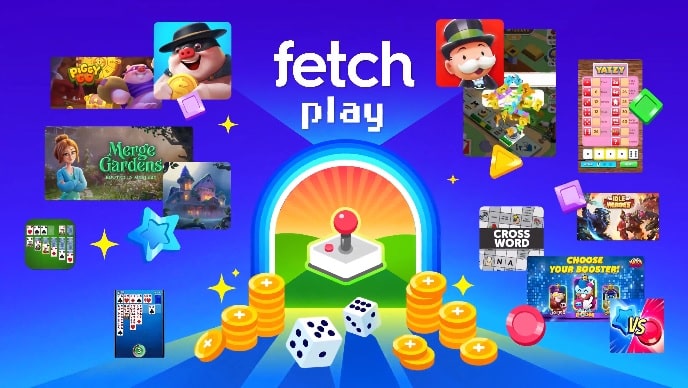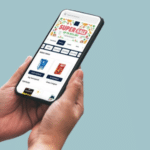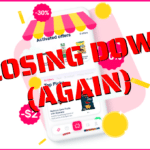
Last year, Fetch was named the country’s most-downloaded coupons and rewards app, for turning your grocery purchases into points that can be redeemed for gift cards. But now, Fetch wants more than just your receipts and your shopping data – it wants your eyeballs and your leisure time, and it’s prepared to reward you for them.
Whatever it takes for more points and more rewards, some users are saying – while others aren’t so sure they’re on board with this idea.
Fetch has begun rolling out “Fetch Play,” a new way to earn points by downloading and playing third-party mobile games. It’s still in beta, so not everyone will have access until later this month. But those who do, can launch Play in the app’s Social tab, and choose from a selection of mobile games to install and play. Different games offer different opportunities to earn Fetch points – by, say, completing in-game challenges, reaching certain milestones, or you can earn points for every minute you spend playing a game, regardless of whether you’re even any good at it.
So what is a receipt-scanning app doing promoting mobile game playing? “It’s a big step towards our goal of making Fetch a true ‘rewards-for-everything’ app,” Fetch spokesperson Allison Geyer told Coupons in the News. “At our core, we’re all about rewards – and we want our users to earn as many points as possible.”
And if it helps Fetch earn rewards of its own in the form of more revenue, while generating more engagement with its partner brands’ offers, all the better.
Fetch launched its Fetch Play feature in partnership with adjoe, which describes itself as an “advertising and monetization platform.” adjoe allows apps like Fetch to monetize their traffic by promoting games to their users. Mobile game publishers monetize their games through interstitial ads and by selling boosts and extra features to players. So the games make more money when apps send them more traffic, the apps make money by promoting the games, and users earn rewards – in this case, Fetch points – which adjoe portrays as a win-win-win for all involved.
The sticking point for many users is that installing the games involves agreeing to a lot of permissions. And according to many user comments on Fetch’s social media pages and app review sites, that’s a deal breaker.
“I didn’t accept the new system because it involved you guys following my every move in my phone,” one Facebook commenter wrote. “Talk about a tad creepy.” Another vowed that “I am not going to turn on ‘Allow Apps Request to Track’ and I don’t have time to play games. Get rid of that nonsense.” “That is the end of Fetch for me,” a Reddit user wrote. “It’s a total time sink for few points plus the tracking across apps… I don’t have time to sit on my phone playing games.”
Another commenter said of Fetch that it “feels like they sold themselves out to the gaming apps & now the users are being punished for it… Your whole gimmick was giving away gift cards for receipt scans, I’m not putting in extra work to ‘play games.'” Many have pleaded for a return to the bonus system that Fetch Play replaced. “The games thing is time consuming and pointless,” a Facebook commenter wrote. “Bring back the daily spin.”
That spin, officially known as the “Daily Reward,” allowed you to spin a virtual wheel, once every 24 hours, upon uploading a receipt to earn bonus points. But few people earned a whole lot that way. “Compared to the average of 5-25 points users were earning via Daily Reward, with Fetch Play, the average user earns 3,500 points per session,” Geyer said. “Beyond the opportunity to earn significantly more points, Fetch Play gives users a lot more to do – the mobile game library hosts approximately 1000 different titles, collaborating with 80 of the top 100 grossing studios. This means users can earn major points for playing games they already love, like Candy Crush, Monopoly, Clash of Clans and more.”
As for the tracking, Fetch insists there’s nothing nefarious about it. “Users who choose to earn rewards via Fetch Play are prompted to allow app tracking so that we can offer rewards for new game apps that are not already installed and customize those offerings based on users’ interests,” Geyer explained. “This helps us provide the best possible user experience via personalized game recommendations.”
Some users are fine with it, seeing the games as little different from similar apps that reward you for watching an ad or performing a task. And the tracking is something that other rewards apps like Swagbucks already do, with its own adjoe-enabled “Playtime Rewards” games. “I downloaded just 2 games and made over 6,000 points and with the daily spin you’d be lucky to get an extra 25,” one Fetch user commented. “You don’t have to play the games,” another advised critics. “Just scan your receipts and move on.”
With the Daily Reward, it could be difficult to actually get daily rewards unless you had receipts to upload every single day. If you buy groceries, say, once a week, Fetch and its offers are largely out of sight, out of mind the rest of the week. With games that reward you whenever you want to play, Fetch can increase engagement, make users come back to the app every day, see the brand offers more often and perhaps buy more of the brands’ products the next time they shop.
On the other hand, just as printing too much money lowers its purchasing power, giving away so many Fetch points could further devalue them. Users have noticed lately that just as they’ve been earning more points, it’s costing more points to get gift cards. Prices “went up when they started daily rewards,” one Reddit user observed, “and then went up again when they took away rewards and added games.”
The other potential drawback to Fetch going all-in on games is that the app could be seen as straying from its mission, squandering the goodwill it’s earned by becoming just another gimmicky rewards app with spammy features that have nothing to do with shopping or the brands that rely on Fetch to help them build shopper loyalty.
“We acknowledge that Fetch Play represents a shift in the user experience, and we are actively listening to user feedback to optimize the feature,” Geyer said. In addition, for those concerned about the permissions that the games require, “as part of our commitment to transparency, we will be updating our terms of service and privacy policy to provide more comprehensive information about Fetch Play as we move past this trial stage.”
So if you don’t have Fetch Play in your app yet, you should see it in the weeks to come. And ultimately, user reaction could determine whether diversifying and offering new ways to earn can help last year’s most-downloaded coupons and rewards app retain that title in the year ahead.
Image source: Fetch











I’ve stopped buying stuff if the only offer is from Fetch and I’m not getting anything else back or not buying it anyway. Their “100% back” (which they’ve renamed, they must have been sued since it’s not true) no longer makes items free if redeeming for a Visa card or popular cards like Amazon and Target. I never won anything major from the daily spin but at least it gave me an incentive to give them access to receipts that they otherwise would not have gotten.
As the other poster said, Ibotta is much simpler and Shopmium is even better (when it works). Submit, get your money back in PayPal, no minimum balance to deal with, no gift card requirement.
Hard pass on the games. I use it to save money which has become harder since they’re charging more for rewards. Example: $5.00 for a $50.00 Kroger gift card. They gouge. No other rebate app I use charges more than face value. Fetch feels more like a scheme with their constant requests to refer people to their app. I also find their animations after submitting receipts to be a colossal waste of time. I wish I could turn them off.
I love the simplicity of Ibotta and getting CASH compared to the games Fetch plays.